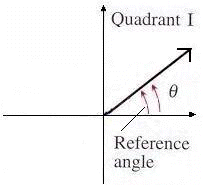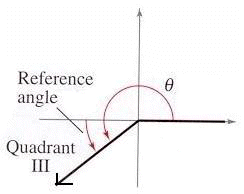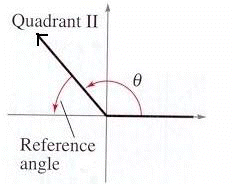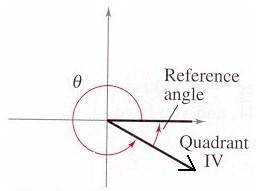TRIGONOMETRIC RATIOS OF MULTIPLES OF "SPECIAL" ANGLES
Example 1:
Find the reference angle
of the following angles.
Let's use the pictures below as a guide.


a.
= 75o
75o it is a QI angle (hint: graph it). Its reference angle
equals 75o as well.
b.
= 150o
150o it is a QII angle (hint: graph it). We calculate its reference angle
as follows:
= 180o
150o = 30o
c.
= 225o
225o it is a QIII angle (hint: graph it). We calculate its reference angle
as follows:
= 225o
180o = 45o
d.
= 300o
300o it is a QIV angle (hint: graph it). We calculate its reference angle
as follows:
= 360o
300o = 60o
e.
=
135o
This angle is not between 0o and 360o. Therefore, we cannot use one of the four reference angle calculations we learned earlier.
However, we learned that negative angles have the same reference angles as their positive counterparts, so let's use 135o.
We will use 135o which is a QII angle (hint: graph it). We calculate its reference angle
as follows:
= 180o
135o = 45o
It follows that the reference angle of
135o is also 45o.
f.
=
315o
This angle is not between 0o and 360o. Therefore, we cannot use one of the four reference angle calculations we learned earlier.
However, we learned that negative angles have the same reference angles as their positive counterparts, so let's use 315o.
We will use 315o which is a QII angle (hint: graph it). We calculate its reference angle
as follows:
= 360o
315o = 45o
It follows that the reference angle of
315o is also 45o.
g.
= 11
/6
NOTE: If radian measure is too uncomfortable for you, change it to degrees. If necessary use the following formula:
3
/5 is a QIV angle (hint: 3
/2
270o)
We calculate its reference angle
as follows:
= 2
11
/6
= 12
/6
11
/6
=
/6
30o
The reference angle is
/6
30o. Note, here we had to use a common denominator before subtracting the fraction!
h.
=
2
/3
NOTE: If radian measure is too uncomfortable for you, change it to degrees.
We need to find the reference angle. However, the given angle is not between 0 and 2
. Therefore, we cannot use one of the four reference angle calculations we learned earlier.
However, one of the four characteristics of reference angles states that negative angles have the same reference angles as their positive counterparts. Therefore, we will find the reference angle using + 2
/3
120o.
2
/3 is a QII angle (hint: 2
/3
120o).
We calculate its reference angle
as follows:
=
2
/3
= 3
/3
2
/3
=
/3
60o
The reference angle for 2
/3 is
/3
60o which is also the reference angle for
2
/3.
i.
= 3
/5
NOTE: If radian measure is too uncomfortable for you, change it to degrees.
3
/5 is a QII angle (hint: 3
/5
108o).
We calculate its reference angle
as follows:
=
3
/5
= 5
/5
3
/5
= 2
/5
72o
Note, here we had to use a common denominator before subtracting the fraction!
Example 2:
Use "All Students Take Calculus" to indicate in which quadrants the terminal side of the following angles
must lie.
a.
All Students Take Calculus - numeric value of cosine is positive in QI and QIV. Therefore, it is negative in QII and QIII.
b.
All Students Take Calculus - numeric value of tangent is positive in QI and QIII.
c.
All Students Take Calculus - numeric value of cotangent is positive in QI and QII. Therefore, it is negative in QII and QIV.
d.
All Students Take Calculus - numeric value of sine is positive in QI and QII. Therefore, it is negative in QIII and QIV.
e.
All Students Take Calculus - numeric value of cosine is positive in QI and QIV.
f.
All Students Take Calculus - numeric value of tangent is positive in QI and QIII. Therefore, it is negative in QII and QIV.
g.
All Students Take Calculus - numeric value of cotangent is positive in QI and QIII.
h.
All Students Take Calculus - numeric value of sine is positive in QI and QII.
Example 3:
Use "All Students Take Calculus" to indicate in which quadrants the terminal side of the following angles
must lie. Assume that
is not a Quadrantal Angle.
a. Identify the quadrant or quadrants for the angle
satisfying the given condition.
and
All Students Take Calculus - numeric value of sine is positive in QI and QII, but only in QII is the numeric value of cosine negative. Therefore, in QII the given conditions are satisfied.
b. Identify the quadrant or quadrants for the angle
satisfying the given condition.
and
All Students Take Calculus - numeric value of cosine is positive in QI and QIV, but only in QI is the numeric value of tangent is also positive. Therefore, in QI the given conditions are satisfied.
c. Identify the quadrant or quadrants for the angle
satisfying the given condition.
and
All Students Take Calculus - numeric value of tangent and cotangent is positive in QI and QIII. Therefore, in QI and QIII the given conditions are satisfied.
d. Identify the quadrant or quadrants for the angle
satisfying the given condition.
and
All Students Take Calculus - numeric value of tangent is positive in QI and QIII, but only in QIII is the numeric value of sine negative. Therefore, in QIII the given conditions are satisfied.
Example 4:
The angle 150o is a multiple of a special angle. Find the EXACT value of cos 150o without a calculator.
Step 1 - Find the reference angle.
150o is a QII angle (hint: graph it), therefore, it has the following reference angle:
= 180o
150o = 30o
Step 2 - Find the value of the given trigonometric ratio of the reference angle.
cos 30o =
We memorized this!
Step 3 - Find the value of the trigonometric ratio of the given angle.
- Use
found in Step 2.
- We learned that the trigonometric ratio of an angle and that of its reference angle have the same ABSOLUTE value. Therefore, the value of cos 150 is either
or
.
- According to "All Students Take Calculus", the cosine ratio has positive values in QI and QVI. The terminal side of 150o lies in QII (hint: graph it). Consequently, cos 150o must have a negative value.
Specifically, cos 150o must be equal to
EXACTLY.
Example 5:
The angle
135o is a multiple of a special angle. Find the EXACT value of sin (
135o) without a calculator.
Step 1 - Find the reference angle.
We need to find the reference angle. However, the given angle is not between 0o and 360o. Therefore, we cannot use one of the four reference angle calculations we learned earlier.
However, one of the four characteristics of reference angles states that negative angles have the same reference angles as their positive counterparts. Therefore, we will find the reference angle using +135o.
135o is a QII angle (hint: graph it), therefore, it has the following reference angle:
= 180o
135o = 45o
(Then,
135o also has a reference angle of 45o.)
Step 2 - Find the value of the given trigonometric ratio of the reference angle.
sin 45o =
We memorized this!
Step 3 - Find the value of the trigonometric ratio of the given angle.
- Use
found in Step 2.
- We learned that the trigonometric ratio of an angle and that of its reference angle have the same ABSOLUTE value. Therefore, the value of sin (
135o) is either
or
.
- According to "All Students Take Calculus", the sine ratio has positive values in QI and QII. The terminal side of
135o lies in QIII (hint: graph it). Consequently, sin
135o must have a negative value.
Specifically, sin (
135o) must be equal to
EXACTLY.
Example 6:
The angle 300o is a multiple of a special angle. Find the EXACT value of cos 300o without a calculator.
Step 1 - Find the reference angle.
300o is a QIV angle (hint: graph it), therefore, it has the following reference angle:
= 360o
300o = 60o
Step 2 - Find the value of the given trigonometric ratio of the reference angle.
cos 60o =
We memorized this!
Step 3 - Find the value of the trigonometric ratio of the given angle.
- Use
found in Step 2.
- We learned that the trigonometric ratio of an angle and that of its reference angle have the same ABSOLUTE value. Therefore, the value of cos 300 is either
or
.
- According to "All Students Take Calculus", the cosine ratio has positive values in QI and QIV. The terminal side of 300o lies in QIV (hint: graph it). Consequently,cos 300o must have a positive value.
Specifically, cos 300o must be equal to
EXACTLY.
Example 7:
The angle
315o is a multiple of a special angle. Find the EXACT value of cos (
315o) without a calculator.
Step 1 - Find the reference angle.
We need to find the reference angle. However, the given angle is not between 0o and 360o. Therefore, we cannot use one of the four reference angle calculations we learned earlier.
However, one of the four characteristics of reference angles states that negative angles have the same reference angles as their positive counterparts. Therefore, we will find the reference angle using +315o.
315o is a QIV angle (hint: graph it), therefore, it has the following reference angle:
= 360o
315o = 45o
(Then,
315o also has a reference angle of 45o.)
Step 2 - Find the value of the given trigonometric ratio of the reference angle.
sin 45o =
We memorized this!
Step 3 - Find the value of the trigonometric ratio of the given angle.
- Use
found in Step 2.
- We learned that the trigonometric ratio of an angle and that of its reference angle have the same ABSOLUTE value. Therefore, the value of cos (
315o) is either
or
.
- According to "All Students Take Calculus", the sine ratio has positive values in QI and QII. The terminal side of
315o lies in QI (hint: graph it). Consequently, cos (
315o ) must have a positive value.
Specifically, cos (
315o) must be equal to
EXACTLY.
Example 8:
The angle 495o is a multiple of a special angle. Find the EXACT value of tan 495o without a calculator.
Please note that no calculator can be used on Exam 1!
Step 1 - Find the reference angle.
We need to find the reference angle. However, this angle is not between 0oand 360o. Therefore, we cannot use one of the four reference angle calculations we learned earlier.
However, one of the four characteristics of reference angles states that coterminal angles have the same reference angle. We know that 495o = 360o(1) + 135o, where 135o is coterminal with 495o.
Therefore, we will use 135o to find the reference angle.
135o is a QII angle (hint: graph it), therefore, it has the following reference angle:
= 180o
135o = 45o
(Then, 495o also has a reference angle of 45o.)
Step 2 - Find the value of the given trigonometric ratio of the reference angle.
tan 45o = 1 We memorized this!
Step 3 - Find the value of the trigonometric ratio of the given angle.
- Use 1 found in Step 2.
- We learned that the trigonometric ratio of an angle and that of its reference angle have the same ABSOLUTE value. Therefore, the value of tan 495o is either 1 or
1.
- According to "All Students Take Calculus", the tangent ratio has positive values in QI and QIII. The terminal side of 495o lies in QII (hint: graph it). Consequently, tan 495o must have a negative value.
Specifically, tan 495o must be equal to
1.
Example 9:
The angle 5
/3 is a multiple of a special angle. Find the EXACT value of sin (5
/3) without a calculator.
NOTE: If radian measure is too uncomfortable for you, change it to degrees. If necessary use the following formula:
Step 1 - Find the reference angle.
5
/3 is a QIV angle (hint: 5
/3
300o), therefore, it has the following reference angle:
= 2

5
/3 Note: You must know how to work with fractions!
= 6
/3
5
/3
=
/3
60o
Step 2 - Find the value of the given trigonometric ratio of the reference angle.
sin (
/3) =
We memorized this!
Step 3 - Find the value of the trigonometric ratio of the given angle.
- Use
found in Step 2.
- We learned that the trigonometric ratio of an angle and that of its reference angle have the same ABSOLUTE value. Therefore, the value of sin 5
/3 is either
or
.
- According to "All Students Take Calculus", the sine ratio has positive values in QI and QII. The terminal side of 5
/3
300o lies in QIV (hint: graph it). Consequently, sin 5
/3 must have a negative value.
Specifically, sin (5
/3) must be equal to
EXACTLY.
Example 10:
The angle 5
/6 is a multiple of a special angle. Find the EXACT value of tan (5
/6) without a calculator.
NOTE: If radian measure is too uncomfortable for you, change it to degrees.
Step 1 - Find the reference angle.
5
/6 is a QII angle (hint: 5
/6
150o), therefore, it has the following reference angle:
=
5
/6 Note: You must know how to work with fractions!
= 6
/6
5
/6
=
/6
30o
Step 2 - Find the value of the given trigonometric ratio of the reference angle.
tan (
/6) =
We memorized this!
Step 3 - Find the value of the trigonometric ratio of the given angle.
- Use
found in Step 2.
- We learned that the trigonometric ratio of an angle and that of its reference angle have the same ABSOLUTE value. Therefore, the value of tan (5
/6) is either
or
.
- According to "All Students Take Calculus", the tangent ratio has positive values in QI and QIII. The terminal side of 5
/6
150o lies in QII (hint: graph it). Consequently, tan 5
/6 must have a negative value.
Specifically, tan (5
/6) must be equal to
EXACTLY.
Example 11:
The angle
5
/4 is a multiple of a special angle. Find the EXACT value of sin (
5
/4) without a calculator.
NOTE: If radian measure is too uncomfortable for you, change it to degrees.
Step 1 - Find the reference angle.
We need to find the reference angle. However, the given angle is not between 0o and 360o. Therefore, we cannot use one of the four reference angle calculations we learned earlier.
However, one of the four characteristics of reference angles states that negative angles have the same reference angles as their positive counterparts. Therefore, we will find the reference angle using + 5
/4.
5
/4 is a QIII angle (hint: 5
/4
225o ), therefore, it has the following reference angle:
= 5
/4
Note: You must know how to work with fractions!
= 5
/4
4
/4
=
(Then,/4
45o
5
/4 also has a reference angle of
/4.)
Step 2 - Find the value of the given trigonometric ratio of the reference angle.
sin (
/4) =
We memorized this!
Step 3 - Find the value of the trigonometric ratio of the given angle.
- Use
found in Step 2.
- We learned that the trigonometric ratio of an angle and that of its reference angle have the same ABSOLUTE value. Therefore, the value of tan (5
/6) is either
or
.
- According to "All Students Take Calculus", the sine ratio has positive values in QI and QII. The terminal side of
5
/4
225o lies in QII (hint: graph it). Consequently, sin (
5
/4 must have a positive value.
Specifically, sin (
5
/4) must be equal to
EXACTLY.






